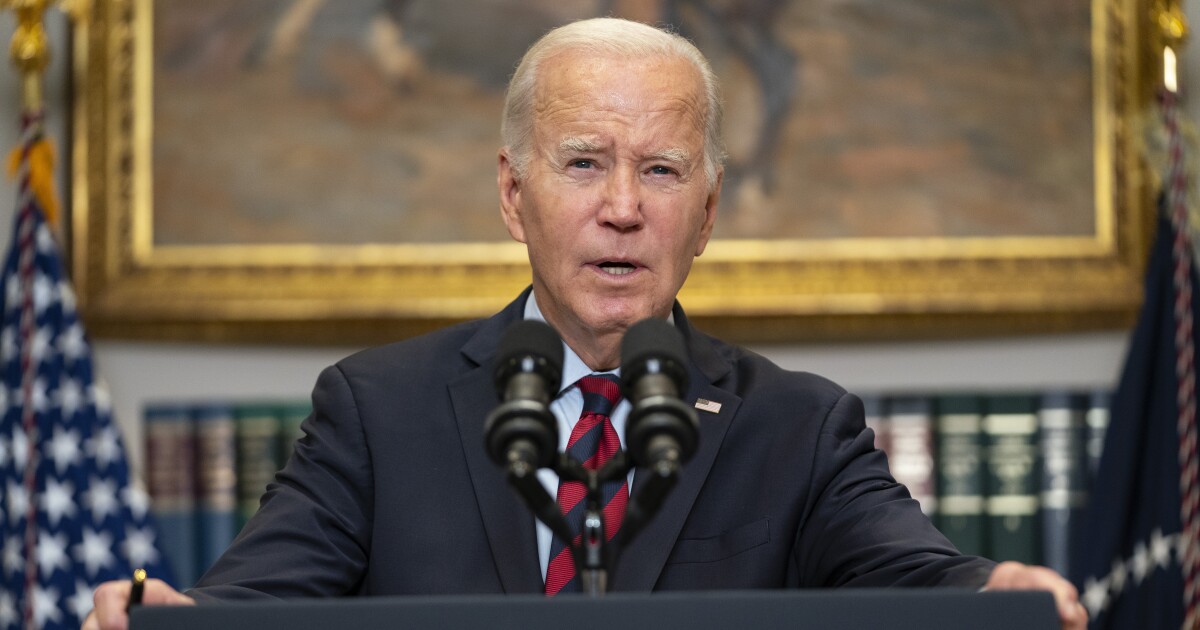

President Joe Biden may have struck a note of bipartisanship after Rep. Kevin McCarthy (R-CA) was removed from the speakership, but the fallout is likely to sow further division in an already polarized Washington.
The White House has requested tens of billions of dollars in additional aid for Ukraine but has been met with resistance from House conservatives frustrated with what they see as a “blank check.” McCarthy had managed that sentiment within his conference, voicing support for Ukraine but also a dose of skepticism. Now, his possible replacements may take a harder line on the issue.
BIDEN EXTENDS $9 BILLION MORE OF STUDENT DEBT RELIEF TO 125,000 BORROWERS
But the challenges for Biden don’t stop there, as the White House must navigate the new political reality with a Nov. 17 deadline to fund the government. The temporary spending bill that averted a government shutdown, following the Biden-McCarthy debt ceiling deal, got the California Republican jettisoned from the speaker’s chair.
The possibility that partisanship will worsen after McCarthy is replaced has already prompted finger-pointing.
Biden, House Minority Leader Hakeem Jeffries (D-NY), and former House Speaker Nancy Pelosi (D-CA) encouraged House Democrats to support the “chaos caucus” turning “Washington into a dysfunctional state” because they thought “they would score cheap political points,” according to one House Republican strategist.
“A paralyzed government only hurts the party in charge,” the strategist told the Washington Examiner. “Expect Republicans’ massive polling advantage on crime, economy, and the border to continue to rise as extreme Democrats still don’t have a solution to the problems facing Americans.”
The public does want bipartisanship, according to Monmouth University Polling Institute Director Patrick Murray. The problem is “politicians rarely pay a price for not compromising,” he said. Murray cited a Monmouth poll from last week in which 64% of adult respondents told pollsters lawmakers should “compromise” on their “spending principles” to avoid a shutdown.
“That’s because partisan voters will blame the opposite party for any lack of compromise,” he added. “It doesn’t move the needle on vote choice.”
Depending on whether House Republicans’ speakership election extends beyond next week’s conference meeting, it is unlikely McCarthy will be “a singular issue in voters’ minds in 2024,” per Murray.
“It does contribute to a narrative of whether Republicans can govern,” the pollster said, however. “As we have seen, voters have ping-ponged between the two parties for House control because they think neither party does a good job. Ironically, in part because they do not compromise.”
“If you are the out-of-power party and you compromise, you lower your chances of winning at the next election because voters are satisfied with how the government is being run,” he went on. “It comes full circle.”
Jeffries told House Democrats this week that leadership endorsed Rep. Matt Gaetz‘s (R-FL) motion to vacate against McCarthy because “extreme” House Republicans had not demonstrated a “willingness” to “find common ground on an enlightened path forward.”
Despite Gaetz alleging he proceeded with the historic procedure because McCarthy dealt with Democrats to keep the government open, the minority leader reportedly played clips during a pre-motion meeting of the former speaker asserting on TV that Democrats would have been responsible for a shutdown. Tensions linger over the Jan. 6 Capitol riot as well.
Although McCarthy did not ask Democrats to save him, that did not prevent him from criticizing them again during his post-motion press conference for their role in his demise — even though he, himself, agreed to change the motion’s rules that allowed for his removal.
“Today was a political decision by the Democrats,” he said. “The things they have done in the past hurt the institution. … My fear is the institution failed today.”
Biden similarly referenced House Republicans’ “dysfunction” before and after a student loan debt relief address Wednesday, acknowledging “the poisonous atmosphere in Washington.”
“I know we have strong disagreements, but we need to stop seeing each other as enemies,” he said. “We need to talk to one another, listen to one another, work with one another. And we can do that.”
Afterward, White House press secretary Karine Jean-Pierre was asked whether Biden and his aides are “loving the fact that Republicans don’t appear to be able to govern the one part of the government that they actually control.”
“Nobody is loving anything,” she told reporters. “It is important for Congress to work — not for us, but on behalf of the American people. It is important to make sure that we meet the challenges of the American people. That’s what’s important.”
Biden earlier admitted he was worried some House Republicans will not back additional Ukraine security and humanitarian assistance, but he recognized that the “majority of members of the House and Senate in both parties” do.
CLICK HERE TO READ MORE FROM THE WASHINGTON EXAMINER
While Jean-Pierre declined to comment on whether there were any regrets regarding McCarthy or on Jordan’s remarks, she did describe House Republicans’ behavior as “shambolic.”
“I don’t want to speak for every American across the country, but I would say the majority of Americans are sick and tired of the infighting that they’re seeing in the House right now,” she said. “They want to see us work in a bipartisan way. The president is willing to do that, right? So, that’s where we are.”





